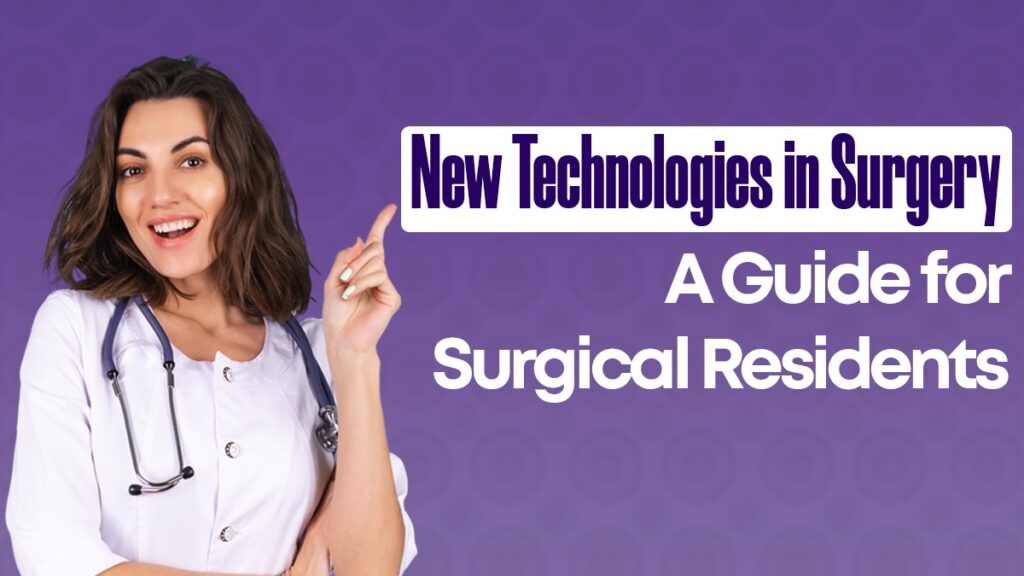
New Technologies in Surgery: A Guide for Surgical Residents
Estimated reading time: 4 minutes
Keeping with the latest technologies has become crucial for the professional development of the resident in general surgery. This handbook reviews the latest technological inventions that are revolutionizing surgery and peeks into the future of surgical residents.
New Innovations in Surgery
1. Robotic-Assisted Surgery
Robotic systems have completely changed surgical practices. Platforms such as the da Vinci Surgical System allow for minimally invasive procedures with enhanced precision. As a surgical resident, taking the time to familiarize yourself with these systems is increasingly more important across many areas of surgical specialties.
2. Artificial Intelligence and Machine Learning
AI is transforming surgery, right from planning in the preoperative setup to giving intraperitoneal guidance. Machine learning predicts the result of surgery and later complications based on massive data sets, making clinical decisions easier. Therefore, surgical trainees must be prepared with AI tools that will be applied in practice.
3. Augmented Reality (AR) and Virtual Reality (VR)
One of the most compelling impacts by AR and VR technologies, however, is on surgical education and planning. What was impossible before-that risky proposition of practicing procedures-would now be no-risk propositions as residents could do it in virtual space. To provide such an environment, conceptualsurgery.com offers immersive surgical simulations for added learning and polishing of skills.
4. 3D Printing in Surgical Planning
This technology, which creates patient-specific anatomical models, is most beneficial in complex scenarios: surgical residents may plan and practice the procedures ahead of time, potentially reducing the time spent within the operating room and increasing the chances of a successful result.
5. Advanced Imaging Technologies
Advanced imaging techniques, from intraoperative MRI to fluorescence-guided surgery, help surgeons see better, in real-time, in high definition, the anatomy. These technologies are increasingly being incorporated into many operations, enabling greater accuracy and safety.
Emerging Technologies in Surgery
1. Nanorobotics
The prospect of microscopic robots that can be released everywhere inside the body is for targeted drug delivery and minimally invasive surgical practice. Nanorobotics are still in the early days of their development but would surely change how we approach some procedures.
2. Bioprinting
Exciting frontier in surgical technology is 3D bioprinting of tissues and organs. Potentially it could balance deficit supply of organs and make every tissue replacement individually tailored. Surgeons-in-training should be wary of the developments here.
3. AI-Powered Surgical Robots
The future surgical robots are likely to have AI which would enable them to perform some functions on their own or semi-autonomously. Such can potentially increase precision and speed in most surgical procedures, especially in microsurgery.
4. Holographic Displays
It will be able to produce 3D illuminations of the patient’s anatomy floating in mid-air, which offers more intuitive ways to interact with imaging data during surgical planning and surgical procedures.
5. Intelligent Surgical Instruments
The development of smart surgical instruments that enable providing intraoperative, real-time feedback on tissue properties or detect lesions will vastly enhance precision and safety in surgery.
Preparation for the Technological Future
As a resident in general surgery, one needs to:
- Stay updated on changes in technology.
- Take advantage of training opportunities during the Surgery Residency Program using up-to-date technologies.
- Continuous learning and adaptation mindset.
- Overreliance on technology and basic surgical skills. The place of surgical education in the era of technology.
- Resources such as ConceptualSurgery.com which provide updated knowledge on surgical technology.
The Role of Surgical Education in the Tech Era
Such technologies are now meant to be incorporated into surgical practices; hence, the nature of surgical education is bound to change. General surgery residency programs are changing to include:
- Training specific to robotic and AI-assisted surgery
- Learning modules based on virtual and augmented reality
- Data interpretation and digital fluency
- Interdisciplinary collaboration with engineers and computer scientists
Conclusion
The landscape in surgery is rapidly changing, driven by the impetus of technological innovations. It is at this point as a surgical resident that one will embrace these changes and keep updating their skills as a tool to success in this career. Mastering new technologies is important, but remember that these are tools to enhance and not replace your clinical judgment and surgical expertise.
Are you a resident in general surgery looking to stay at the forefront of surgical technology? Visit ConceptualSurgery.com today to access our comprehensive library of surgical videos, training resources, and the latest insights into technological advancements in surgery. Join our community of forward-thinking surgeons and prepare yourself for the future of surgical care!
